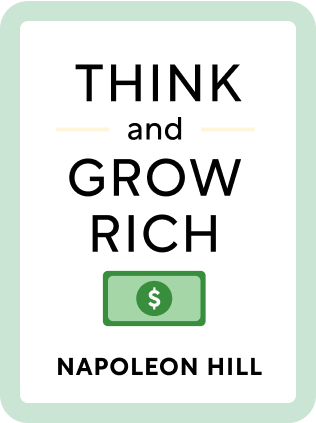

This article is an excerpt from the Shortform book guide to "Think and Grow Rich" by Napoleon Hill. Shortform has the world's best summaries and analyses of books you should be reading.
Like this article? Sign up for a free trial here .
What are the major principles of Think and Grow Rich? How can you apply the Think and Grow Rich principles?
The major principles of Think and Grow Rich are clarity of purpose, focus, and persistence. You can apply the principles by following the action plan in the book with a positive mindset.
Read on to discover more about the essential principles of Think and Grow Rich.
What Are the Principles of Think and Grow Rich?
The Think and Grow Rich book, originally published in 1937 in the aftermath of the Great Depression. It offers a formula and step-by-step instructions for getting rich, which author Napoleon Hill asserts are accessible to everyone regardless of their circumstances. The book was well-received by depression-weary citizens and remained a bestseller for decades. It is still popular today.
People who want to make a lot of money are the primary target of the advice given in the Think and Grow Rich book, but the principles of Think and Grow Rich are also applicable by those who define success differently.
Hill’s premise is that your thoughts, whether positive or negative, become your reality. You must control your thoughts if you want to control your destiny. If your dominant thoughts are about riches (which can mean wealth, happiness, success in business, successful relationships etc.) you can become rich.
The best way to control your mind is to keep it occupied by having a single, specific goal (a definite purpose), making it your all-consuming desire, and pursuing it with persistence and faith that you can achieve it.
There are 13 principles of Think and Grow Rich that will help you change your mindset and achieve your goal through positive thinking. Hill gleaned these principles from interviews with more than 500 wealthy and successful people, including Thomas Edison, Henry Ford, and Charles Schwab. Hill says his interview project began with a conversation with steel magnate Andrew Carnegie, who challenged him to spend 20 years interviewing millionaires to capture in writing a philosophy of success that could be replicated by anyone willing to learn and apply the principles.
Principle 1: Think Success by Default
Thoughts are powerful: What you think becomes your reality. We all have the power to control our thoughts, although many people don’t use it. If you harness this power, you can become wealthy, or achieve what you seek.
The way to achieve riches is to become success-conscious, rather than failure-conscious:
- Start by focusing your mind on a single, clearly defined purpose, not multiple purposes that would dilute your focus. Choose one overriding life goal.
- Make achieving this goal your all-consuming desire, to the point that you think of little else and you devote all your time and energy to achieving it.
- Finally, be persistent in pursuing your one goal or purpose. You will encounter setbacks but have faith in your goal and ability to achieve it — and never give up on it.
Here’s how this process worked in the lives of two men.
Example 1: Partnering with Edison
- Edwin C. Barnes had an overriding goal (his definite purpose) of working with the inventor Thomas Edison. Partnering with Edison became his all-consuming desire.
- Despite never having met Edison, Barnes went to see and told him his goal. Edison recognized his determination but gave him a lesser job. While this might seem like a defeat, Barnes agreed to work for Edison, but persisted in focusing on his specific goal of a partnership.
- This went on for five years, but he didn’t give up on his goal or stop thinking about it.
- Barnes saw an opportunity when Edison couldn’t get his salespeople to sell his new dictating machine. Barnes said he could sell it and was given the opportunity. He sold it so successfully that Edison gave him a contract to distribute and market the machine.
- Thus, Barnes thought his way into a partnership with Edison. Continuing to believe he could be successful allowed him to persist, which allowed him to seize the opportunity when it surfaced.
Example 2: Striking Gold
- A man had a specific purpose and desire to find gold. He discovered a small amount of gold, staked a claim, and raised money for the machinery and labor to extract more.
- But after much work, the effort came up empty. He lacked persistence, so he quit, selling the machinery to a ‘junk’ man.
- Before reselling the machinery as junk, the junk man hired an engineer, who advised that the gold lay just three feet from where the manhad stopped drilling.
- The engineer was right and the junk man made a fortune because of the first man’s failure to persist.
Similarly, the 500 wealthy men interviewed by Hill told him their greatest successes came when they persisted in going one step beyond a failure or setback. Thomas Edison reportedly tried and failed 10,000 times before inventing a successful electric lightbulb.
Temporary defeats are common in most endeavors, and they often seem to come when success is within reach. Unlike Edison, though, many people quit too soon.
Principle 2: Have an All-Consuming Desire
The first step to riches is having an all-consuming desire to achieve your specific goal or definite purpose.
Hopes or wishes for something aren’t enough — in fact, if your desire is no more than a wish, you’re likely to quit striving for it when you hit roadblocks. You have to want something badly in order to achieve it.
Your hunger to reach your goal must be so strong that you stake everything on achieving it, and you burn your bridges, leaving yourself with no way to retreat.
Your goal has to be overriding — you can only devote your full energy to a single goal at the same time.
Examples of strong desires laying the foundation for success:
Example 1: Edwin C. Barnes’ burning desire
Barnes’ story highlights why having a burning desire is one of the most important principles of Think and Grow Rich. Here is a closer look at how his intense desire to partner with Edison played out. To start with, his goal was specific: He wanted to partner with Edison, not work for him. It became the consuming obsession of his life, and when he was ready to act on it, he left behind his past life and devoted everything to reaching his goal.
While Barnes worked for Edison as a mere salesman for five years, he didn’t give up on his desire for a partnership or decide to do something else instead — his desire only grew stronger, and he focused on becoming Edison’s partner until it became a reality.
Example 2: Department store founder Marshall Field
After the Great Chicago Fire of 1871, many merchants who lost their businesses chose to leave the city in defeat rather than to rebuild. However, one merchant, Marshall Field, refused to give up. He had an overwhelming desire to build the world’s greatest store on the ruins of his original store, no matter how many times it burned down. He built the Marshall Field’s department store in downtown Chicago, which eventually grew into a national chain.
Example 3: Director Steven Spielberg
Steven Spielberg had an all-consuming desire to make movies. He had made films as an amateur, but hadn’t broken into the industry. He came up with a unique idea for literally getting in the door. He took a Universal Studios Tour, then sneaked away and hid on the lot until after the tram had left. As he left at the end of the day, he made a point of speaking to the guard. Because the guard then recognized him, he was able to return daily for three months.
Then Spielberg’s burning desire drove him to find other entry points. He always wore a suit and carried a briefcase, giving the impression he was a student with a summer job there. He spoke often to directors, writers, and editors. He found a vacant office and moved in, and he added his name to the directory. Spielberg eventually got to know the head of production for the television department, who became his mentor and gave him opportunities to produce films.
Spielberg’s application of the principles of Think and Grow Rich forced him through obstacles that would have held back many others in his position. His desire seemed all-consuming, and he was willing to do anything to achieve it.
Principles 3 and 4: Have Unwavering Faith
In addition to having an intense desire for riches or other success, you also must have an unwavering faith or belief in your goal and your ability to achieve it.
Faith or belief is also one of the most important principles of Think and Grow Rich. Faith helps in converting our thoughts into reality. Faith works on a subconscious level and helps move you toward your goal.
If you have faith in yourself and your plans to achieve wealth, it will prompt ideas and associations that lead you to success.
But if you lack faith and believe the opposite, you’ll defeat yourself. For instance, if you believe that you’re doomed to poverty due to forces beyond your control, this negative belief will take over your mind. It will block out positive thoughts and desires that could help you overcome your circumstances, and you will fail to improve your current state.
So to achieve your goal, it’s important to develop faith to propel you toward it, and inspire others to work with you. You can develop faith through affirmation and visualization (which the author calls autosuggestion) — that is, by constantly telling yourself you can succeed and by envisioning yourself succeeding (more on autosuggestion later).
You eventually come to believe the things you repeat to yourself. If you write down your goal and repeat it frequently by reading it out loud, you’ll reinforce it in your mind and convince your subconscious to act on it.
You can go a step beyond envisioning yourself succeeding by acting as though you already have the thing you want. Your mind takes on the nature of the thoughts that dominate it.
If you lack self-confidence, or faith in yourself, you can change that, and increase your chances of success, by doing and repeating the following:
- I know I have the ability to achieve my specific goal.
- I will concentrate my thoughts for 30 minutes a day on the person I intend to become.
- I will spend 10 minutes a day demanding self-confidence from myself.
- My goal demands that I develop self-confidence to achieve it.
- I will cultivate positive thoughts toward myself and others. I have faith that I will change my thoughts and become self-reliant and successful.
Principles 5 and 6: Specialized Knowledge and the Master Mind
Knowledge is critical to making better decisions and achieving your goals.
There are two types of knowledge identified in the Think and Grow Rich book: general and specialized. Colleges provide general knowledge, but often this knowledge lacks practical application. If you want to get rich, the type of knowledge you need is specialized and specific to the particular industry or endeavor you’ve chosen as your path. This is why college degrees aren’t guarantees of career success — formal education should be viewed only as the beginning for acquiring knowledge.
To make progress towards applying the principles of Think and Grow Rich, figure out what sort of specialized knowledge you need, and why you need it. Then figure out how to get it. There are various ways to gain this specialized knowledge, including training programs, books, research and experimentation, and personal experience.
Never stop gaining specialized knowledge related to your goal. Don’t make the mistake of thinking your learning ends when you graduate from school. In fact, much of the practical knowledge that gets you toward your life’s goals comes after school. Combining a hunger for knowledge with imagination will help you adapt to changing times.
The Master Mind
Despite the importance of specialized knowledge, don’t feel like you need to know every necessary piece of knowledge yourself in order to achieve your goal. Instead, you need a MasterMind group — a group of associates who have the knowledge, advice and expertise to help you achieve your goal.
No one has enough experience, education, and ability to accumulate a fortune single-handedly. You need a Master Mind group to help you shape a plan for reaching your goal.
Henry Ford demonstrated this to great effect:
- A newspaper called him “an ignorant pacifist,” and Ford sued.
- In court, the paper’s lawyers tried to argue that the statement was accurate: Ford was indeed “ignorant.” They put Ford on the stand and began asking him trivia questions, like “how many soldiers did the British send to the American colonies in 1776?”
- Ford tired of the questions, and replied that at the touch of a button he could summon someone who could answer any question he had about his business. Why would he clutter his mind with useless general knowledge when he had people around him who could supply any knowledge he demanded?
No matter how much knowledge he contains himself, anyone who knows where to get knowledge when needed is an educated individual. Through his Master Mind group, Henry Ford had all the specialized knowledge he needed to start an automobile revolution.
The same was true of Andrew Carnegie. He reportedly once said he didn’t know anything about the technical aspects of the steel business, and he didn’t particularly care to — because his Master Mind group knew everything necessary for making and selling steel.
A group of dedicated minds brainstorming and thinking together can connect and build on one another’s ideas and insights. Together, you and your Master Mind can achieve something greater than any individual could achieve alone.
Both of these examples also illustrate another point — someone who’s had limited formal education should never doubt their ability to apply the principles of Think and Grow Rich, because specialized knowledge is always accessible. Ford and Thomas Edison had little formal schooling but were hugely successful in their chosen fields because they knew where and how to get the knowledge they needed.
More examples of Master Minds:
- President Franklin D. Roosevelt had a group called his Brain Trust. He brought the best minds in the country to Washington to solve economic problems.
- Ross Perot left IBM to create his own company, Electronic Data Systems (EDS). Although he was discouraged against going out on his own, he assembled a small team of dedicated experts who shared his goal and helped create the company.
Here are the steps to forming your own Master Mind group:
- Make a list of people who have the necessary knowledge, experience, and resources to create and carry out the plan that will achieve your goal.
- Decide what you have to offer to people you want in your Master Mind group. No one will join your effort without some kind of benefit or compensation, which can be money or something else.
- Meet with the members of your group twice or more a week, until you come up with a plan or plans for achieving your goal.
- Make it a priority to maintain harmony in the group.
Principle 7: Imagination
Your imagination is a crucial tool for converting your thoughts into riches. You can create anything you can imagine.
Your imagination can spark both ideas and plans for achieving them. Your powers of imagination decline if you don’t regularly use them, but they also improve with use. Keep thinking about big, ambitious ideas.
There are two types of imagination — synthetic and creative — and both can play a role in the transformation process. The synthetic imagination rearranges existing ideas and concepts in new ways. The creative imagination, which works in the subconscious, generates new ideas, and through hunches and inspiration, it produces the plan you need to follow to achieve your goal.
The world’s greatest business leaders, thinkers and artists used their creative imagination to come up with works of art, inventions, and products. Great fortunes start with ideas generated by imagination. Here are two examples of the role imagination played in creating ideas that produced riches:
- A doctor had come up with a recipe for a syrupy soda fountain beverage, but it didn’t sell very well. Eventually, to pay off his debts, he sold the formula, a kettle, and soda fountain equipment to a drugstore clerk for $500. The drugstore clerk, Asa Candler, applied imagination to come up with an innovative promotion and marketing campaign that transformed the beverage into a household name, Coca-Cola. One of his ideas, which became legendary, was touting Coca-Cola as having a “secret” ingredient. This gave it the competitive advantage of seeming mysterious and unique, and it’s still quoted today.
- A clergyman had an idea to start a technical school to train students in practical applications of technology, but he needed $1 million to do it. Through imagination he came up with a bold plan to get it — he gave a sermon titled “What I would do with $1 million.” Soon after the speech, a member of the audience gave him the money to start the training institute.
Don’t forget that ideas are just ideas, and they need to be acted on to become real. But great ideas can take on a momentum of their own, spurring you to act and persist until they transform into reality.
Principle 8: Planning
It’s often said that knowledge is power, but actually, knowledge is only potential power. Knowledge only becomes actual power if it can be put to use as part of an organized plan.
If your first plan doesn’t work, replace it with a new one. In fact, keep replacing failed plans until you come up with one that works.
Many people who fail do so because they lack the persistence to keep working to come up with a better plan when an earlier one fails. They don’t understand that defeat is temporary, and only means there was something wrong with your plan, which can be fixed if you keep trying until you get it right. Thomas Edison met with temporary defeat 10,000 times before inventing a successful lightbulb.
Don’t be a quitter who gives up before you achieve your goal. Also, be sure to select as members for your Master Mind group people who will not be stymied by defeat.
Important note: Ideas must be nursed from birth, if they are to survive and succeed. When you have an idea, you must activate it with a definite plan and immediate action.
Principle 9: Decisiveness
According to the Think and Grow Rich book, a common reason for failing to become wealthy is the inability to make and stick with a decision.
Successful people reach decisions quickly, and change them slowly if at all — so they don’t get sidetracked from their plan.
Unsuccessful people do the opposite: They put off making decisions and, once they’ve finally decided something, they change their minds quickly. This makes it impossible to move consistently toward a goal.
Henry Ford had a reputation for acting decisively and standing firm on decisions. For example, he held firm on his decision to continue making the Model T, long after advisors and customers had urged him to change it. As a result, he continued to make money for a while, and was able to put off expending resources to develop another model. While some considered him obstinate, that quality is preferable to being indecisive.
Procrastination, the opposite of decisiveness, is a common obstacle that you must overcome.
People who can’t reach decisions promptly and stick with them will fail to effectively apply the principles of Think and Grow Rich. They lack desire of their own and are thus easily influenced by the opinions of others, in effect allowing others to do their thinking for them. You have a mind of your own, which you must use to make decisions if you want to succeed.
Decisive people are undeterred by others’ criticism — what they want to do is what they’re going to do, regardless of what others think. Indecisive people take others’ negative opinions to heart, and sometimes develop inferiority complexes as a result.
The most important and influential decisions are those that require the most courage to make — those with the highest stakes.
One of the most notable examples is the American colonists’ decision to oppose British rule. Although they could have been hanged for treason, leaders of the 13 colonies convened the First Continental Congress (a Master Mind group) in 1774 to coordinate their opposition to British demands. Without their decision to band together for one purpose, no Declaration of Independence would have been created. The signing of that document by 56 men also was a courageous decision, because it too could have led to execution for treason.
Because of these decisions a nation was born — a desire became a reality. Great changes like this often take root with a definitive decision in the minds of only a few people.
Principle 10: Persistence
You can’t transform thoughts and desire into money without persistence. You’ll inevitably run into obstacles in the pursuit of your goal, and you need the willpower to keep pushing through those obstacles..
While most people give up at the first sign of difficulty, successful people persist with unstoppable willpower and desire. Those who carry on with single-minded determination despite opposition may be seen as cold-blooded or ruthless, but what they are doing is simply exerting the will to achieve their desire. If you don’t have persistence, you won’t succeed at anything significant.
Example: When Howard Schultz first opened Starbucks, it lost money for three straight years, including more than $1 million in 1989 alone. But Schultz never gave up. He believed strongly that his plans for building a chain of coffee shops were solid, and the company would soon be profitable. Eventually his Seattle stores did become profitable and he expanded the business to other cities and then other countries, making Schultz one of the world’s richest people.
The challenge of following the principles of Think and Grow Rich for achieving riches is itself a test of your persistence. The process for applying persistence can be slow at first, like that of surfacing from a deep dream in which you can’t move — you start to awaken slowly, willing yourself to regain control of one set of muscles at a time, until you finally “snap’ awake. If you don’t have ideal persistence today, you can build persistence gradually, until one day you suddenly awaken and get it.
Four requirements for developing persistence are:
- A specific goal or purpose, and an all-consuming desire to achieve it.
- A specific plan that you pursue non-stop.
- A mind that blocks out negativity and discouragement.
- A Master Mind group whose members encourage you.
Your payoff for following these four steps is the ability to write your own ticket in life.
You should also examine yourself methodically for signs that you lack persistence:
- Motivation
- You’re indifferent: You’re willing to compromise on your goal rather than fight for it.
- Your desire is weak because you lack a motive that drives you to act.
- You lack ambition to be wealthy, to act so that you become wealthy, and to own wealth.
- You’re self-satisfied: You can’t better yourself or your circumstances if you remain complacent or smug about where you are.
- Specificity of Goal
- You can’t define what you want, and so have nothing to work toward.
- You don’t have any plans that are thought-out and written so they can be evaluated.
- Work Habits
- You procrastinate, using excuses and alibis to justify not making plans or acting.
- You have no interest in obtaining specialized knowledge necessary to succeed.
- You don’t act on ideas or recognize when opportunity presents itself.
- You search for shortcuts to riches instead of ‘paying your dues.’
- Mindset
- You’re indecisive, passing the buck to avoid making decisions.
- You blame others for your mistakes and accept mistakes as unavoidable, which means you don’t learn from them.
- You’re eager to quit at the first sign of defeat.
- You’re always wishing for things instead of applying willpower to make them happen.
- You worry about what others think, and so fail to act for fear of social rejection.
Reflect on each of these signs to see if they apply to you. If so, create a plan to solve your weakness. If you succeed, you will improve your persistence.
To build persistence:
- Use affirmation and visualization (autosuggestion) to keep a clear picture of what you desire foremost in your mind, which will attract it to you.
- Renew and strengthen your desire for riches. Weak desire leads to weak results.
- Seek help to develop your persistence from your Master Mind group.
- Ensure that you have the complete recipe: a definite purpose, desire, faith, a specific plan, accurate knowledge, cooperation of a Master Mind group, and willpower. and ability to make persistence a habit.
Principle 11: Sex Energy Transmutation
According to the Think and Grow Rich book, the desire for sex is the most powerful of human desires. Some people risk their life and reputation to get it. This energy can be harnessed to help you achieve your goals.
Hill refers to sex as being both energy and as an emotion (a state of mind). The emotion of sex has three benefits: perpetuation of the human race, maintenance of health (it has therapeutic value), and transforming average ability into genius via “transmutation.”
Transmutation means harnessing the power of sex energy to make you wealthy by redirecting your thoughts from the physical expression of sex to creative efforts. When redirected, the powerful motivating force of sex energy can be a creative force for art, literature, music, invention, or achieving riches. Redirected sex energy is the creative energy of all geniuses.
As suggestive evidence, take the sex organs out of an animal, and you remove all the fight and energy from the animal. A castrated bull becomes as calm as a cow.
The emotion of sex needs an outlet; it shouldn’t be repressed but instead given an outlet that enriches the body, mind, and spirit. Transforming sex energy into creativity requires willpower.
Creative imagination is unleashed when a stimulant — sex energy being the most powerful one — acts on the mind to increase brain activity or vibrations. The other stimuli are love, burning desire for money or power, music, friendship, a Master Mind alliance, mutual suffering through persecution, autosuggestion, fear, and drugs or alcohol. But these are far less powerful than the stimulation from the desire for sexual expression.
Of the stimuli, only sex and love, which are particularly powerful together, can inspire genius. Napoleon Hill found that every great male leader he analyzed was inspired by a woman.
For example, when Napoleon Boneparte was inspired by his first wife Josephine, he was invincible. When he ended his relationship with her, he was defeated. Similarly, Abraham Lincoln discovered his creative imagination when his mind was stimulated by the love of Anne Rutledge. A businessman noted that his attractive secretary’s presence drove him to new heights of creative energy.
Salespeople and others with strong charisma create their personal magnetism from redirected sex energy, whether they realize it or not.
People without formal education can achieve greatness through the use of creative imagination, stimulated by sex energy. But people rarely achieve great wealth or other success before age 40, because they waste their energies in the physical expression of sex, rather than harnessing the energy for mental creativity. For example, Henry Ford’s and Andrew Carnegie’s greatest achievements occurred after age 40.
In addition to sparking creativity, the emotion of sex combined with the emotion of love changes people for the better by enhancing judgment, balance, calmness, and focus.
Of course, sexual energy when overindulged can be as damaging as drugs or alcohol. A sex-addicted person has lost rationality and willpower. Sex energy should be harnessed responsibly and with temperance.
Advice on Love
- Love is life’s greatest experience.
- Love is spiritual; sex is biological.
- All love is beneficial.
- Enjoy love while you have it rather than worrying about losing it.
- Even if you loved and lost, love still benefited you.
- No two love experiences affect you the same way.
- When love and sex are blended, marriage brings a state of mind as close to spiritual as we can get.
Principle 12: The Subconscious Mind
The subconscious mind collects and files impressions and thoughts received through the five senses. The information collected may be positive or negative. It is also the source of creative imagination, which shapes your utilization of the principles of Think and Grow Rich to achieve riches.
You have the ability to plant thoughts, plans, or goals in your subconscious that you aim to transform into riches. If these thoughts are dominant and supported by faith that you’ll reach your goal, your subconscious mind will lead you to riches.
As previously discussed, the way to plant thoughts of riches in your subconscious mind is to use affirmation or autosuggestion. Positive thoughts must become a habit before they can translate into reality.
The subconscious mind is our link with Infinite Intelligence, or First Cause, which is the energy that powers atoms and drives the laws of nature. It is the medium through which prayers are transmitted. When we transmit our thoughts and desires with faith, we get back answers to our prayers in the form of plans or ideas to get what we’re asking for.
However, your subconscious can be equally influenced by negative thoughts that you passively allow to enter. The most common negative thoughts or emotions to watch out for are fear, jealousy, hatred, revenge, greed, superstition, and anger. They are particularly dangerous because the subconscious mind is more susceptible to thoughts that have an emotional component.
If you allow negative thoughts to fester, you will block your creative imagination from functioning. Instead, you should use autosuggestion to cultivate positive thoughts and emotions — desire, faith, love, sex, enthusiasm, romance, and hope — which stimulate your subconscious to produce creative energy.
Positive and negative emotions can’t occupy your mind at the same time — one will dominate. A single negative thought is sufficient to block your mind from helping you reach your goal. Even prayer can have a negative effect, because people often pray as a last resort, when their minds are filled with fear and doubt.
To fully engage the power of your subconscious mind to reach your goal, practice faith and positive thinking until it becomes habit.
Principles 13 & 14: The Brain and the Sixth Sense
(Shortform note: This is Napoleon Hill’s attempt to justify the principles of Think and Grow Rich with some scientific rigor. These ideas aren’t accurate by today’s science and they’re not important to applying the rest of the book, but something in here may resonate with you.)
We don’t know exactly how thoughts become reality. But we know that there are intangible forces at work in the universe, even if we can’t perceive them with our five senses.
Intangible forces move oceans, create thunderstorms, and fuel the soil that provides our food; electricity is an intangible force. For all of our education, we don’t understand the intangible force of thought, and how the brain and its network of nerves translate thought into reality. But we are learning more about the brain all the time. It’s likely that the brain, through its intangible processes, can communicate with other intangible forces outside us.
Our brain performs as both a broadcasting and receiving station for thought vibrations. From the ether or energy of the universe, our brain uses the “receiving set” of creative imagination to pick up thought vibrations from other brains — especially when amped up to a high rate of vibration by emotions such as sex. When at their highest level, our thoughts can be broadcast by the subconscious mind to be picked up by other brains.
Experiments in telepathy show that minds can communicate with other minds, without words being spoken. (In experiments, some people have been able to name cards in an unseen pack, or read a thought in another person’s mind.) Master Mind groups can work this way, exchanging, blending, and building on each others’ thoughts until solutions are reached.

———End of Preview———
Like what you just read? Read the rest of the world's best book summary and analysis of Napoleon Hill's "Think and Grow Rich" at Shortform .
Here's what you'll find in our full Think and Grow Rich summary :
- Napoleon Hill's 1937 guide to success
- How to use thoughts, visualization, and affirmation to achieve wealth
- The importance of a Master Mind group and how to start one







I av read the book once nd many years back ….yes I applied the principles ND it worked for me .
I want to reapply these principles ND restart my life from bottom of the rocks I know it will work for me ND anyone whom believes in themselves .
Thanks for the clear summary. You are really good.
Awesome. You gave a detailed summary of the book and outlined specific examples to portray each principle. Great job